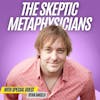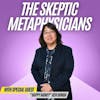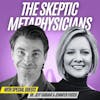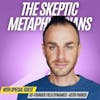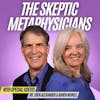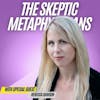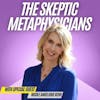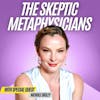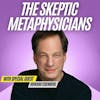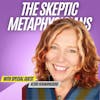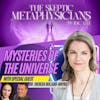The Healing Power of Pleasure | Julia Paulette Hollenbery
Connection with others is the most important thing. But so often we go through life assuming our connection is there, when in reality we’re just going through the paces and not REALLY connecting with each other. So how do we actually ensure that the true, deep human connection that we all crave does really happen for us? Not just with our significant others but with all of humanity?
"We don't live in a culture that encourages pleasure. We live in a culture that does the opposite. So its kind of revolutionary to start to turn the lens around and to take responsibility, to be curious, to be interested, to want to find out a great deal more about pleasure for ourselves. We are built for sensuality and we live in this very sensual, multidimensional world." --Julia Paulette Hollenbery
Hidden just below the surface of ordinary everyday reality lies an abundance of pleasure and delight. By learning to look beyond your daily challenges, to ease your stressed mind and body, you can rediscover the magic, mystery, sensuality, and joy that is possible in everyday life.
Taking you through a step-by-step sensual journey of healing and transformation, Julia Hollenbery explains how pleasure is all around us and explores seven easily accessible spiritual “medicines” or pathways to discover more sensual pleasure and delight in your body, relationships, and way of being.
She details each of the seven medicines in depth: slowing down, embodying, deepening, relating, pleasure, power, and potency. For each medicine, she presents reflections, practical somatic and breathing exercises, prompting questions, meditations, and energetic transmissions to help you reconnect body, mind, and soul in an integrated way and reclaim your innate source of pleasure.
About Our Guest:
Julia Paulette Hollenbery is a bodyworker, therapist, mystic, healer, and facilitator. For more than 25 years she has guided countless clients into deep confidence and self-authority. She is passionate about sharing her life-long love of the mystery, real sensual relationship, and the life of the body.
Guest Info:
Website: universeofdeliciousness.com
Facebook: @julia.hollenbery
Instagram: @julia.paulette.hollenbery
Twitter: @JuliaHollenbery
LinkedIN: @juliahollenbery
Facebook Group: Power of Pleasure Community
Skeptic Metaphysician Info:
Website: https://www.skepticmetaphysician.com
IG: https://www.instagram.com/skepticmetaphysician_podcast
Twitter: https://twitter.com/WillRodriguezFl
Facebook: https://www.facebook.com/SkepticMetaphysician
Get Your Skeptic Metaphysicians Merch: https://www.skepticmetaphysician.com/store
Like the show? We'd love to hear your thoughts!
Please rate/review the show here:
https://lovethepodcast.com/SkepticMetaphysicians
Healing power of Pleasure
Will: [00:00:00] Karen, here's some questions I found from our guests website that they're fascinating cause it kind of sets up the interview really well. So have you ever found that being. It's not nearly as much fun as you hope to be.
Karen: Oh, as much. Well, no, sometimes some things are more fun, but a lot of things are much, much less fun.
Right.
Will: That's a perfect term for it. Now, what about your work? Is it boring and stressful? It,
Karen: you know, it can be very stressful. It used to not feel like work, but lately it's gotten to the point where it's
Will: okay, this next one scares me. Are your relationships discipline?
Karen: In that regard, I am very fortunate.
I have really wonderful relationships, no issues, no problems, nothing I'd want to change. They are
Will: fantastic. Well, that's good to hear your partner must be very happy then. I hope that down. Do you miss the instinctual intuitive connection to life you had as a child?
Karen: I do. I mean every once in a while I'll get a little pop of it and it'll remind me, but then I get busy doing laundry or something like that.
And it just sucks the joy, right? Yeah.
Will: And then the last one, do you [00:01:00] feel, feel that you're living a smaller life than what is your birth? That is a loaded question, loaded question.
Will: Hey everyone. Welcome back to the skeptic metaphysician. I am. I think I say this every time, Karen, I'm so excited to have you on the show, but also our next guest. But specifically, because our next guest comes to us all the way from the UK, from London.
Karen: This is very exciting. We're
Will: international. Now. We, we, yeah, we have been for a while, but now we're officially international.
We have a guest from the UK. You are officially international and it's good. It's easier because she actually speaks our language. So we had someone [00:02:00] from like China. We'd we'd have a.
Karen: Yeah, it is helpful that we speak the same lane. So I'll say the
Will: same, a few differences. Right, right.
She is a bodyworker therapist, mystic healer, and facilitator.
Now for more than 25 years, she's guided. Clients countless into deep confidence and self authority. Sounds like something I need. Actually, she's passionate about sharing her lifelong love of mystery, real central relationship and the life of the body, which I'm sure we'll get into a lot today.
She comes to us all the way from London, UK, and her website. Really all you need to know to get a great sense of what she's about. It's universe of deliciousness.com. So it is an absolute pleasure. Speaking of pleasure to welcome Julia Paulette Holland Bree. Right. Did I say that correctly? Juliet was
Julia Paulette Hollenbery: great.
Great.
Will: It's wonderful to have you. I did try to use the British pronunciation of your last name. I would say Holland Berry in the America, but it just sounds so plebeian say it that way, right? When you say so much nicer Holland, Bri, so welcome to the show. Thank
Julia Paulette Hollenbery: you. Hello? Lovely. [00:03:00] So far already to be,
Will: I think she's listened to the show a couple of times, but
Karen: I like the positive outlook for the optimism.
Will: Yeah. Well, and in fact that's what she's all about, right? On her website. And if you go to her website, she's got a lot of information about herself. It intrigued me because Julie, you talked about your intrinsic connection to life in the universe and everything as a child, and how over time That connection kind of got beat down a little bit by adulthood responsibilities, just life in general. And you've helped lots and lots of people yourself included to reignite the connection with life with the universe. Is that fair?
Julia Paulette Hollenbery: I think so. Yes. When I am working with people, I would love to see how their faces changed during a session.
It's beautiful to see people light up and look more beautiful. So yes, of course there are many of us doing this kind of good work.
Will: There are indeed, but You have a very specific way of doing this, right? You [00:04:00] hope to help people celebrate their love of life, their central ness, their desire.
I mean, everything in a, in a positive light by way of being perfectly in tune with your body and your soul and your spirituality. Can you tell us a little.
Julia Paulette Hollenbery: Well, hopefully yes, but I don't know that anything is ever perfect. And in fact,
it seems to me that it is through the imperfections it's through the cracks, it's through the difficulties and challenges. It's through the uncomfortable moments that we. Often come to find the richer, more delightful, more satisfying pleasures.
Karen: And that sounds wonderful, but I think for a lot of people that might be a huge challenge and I'm so glad there is someone like you that can help. Even you talk about your connection to, you know, the mind and the body and me, I wake up every morning and my back hurts. I have some issue with my back, so that kind of on certain days can set my mode for the day.
So how do I get around that initial and find the [00:05:00] joy in.
Julia Paulette Hollenbery: So there is no such thing as perfection. There really isn't. There is no perfect synthesis, you know, all these new age, spiritual words that get used and they're lovely they're pointers, but there absolutely is no perfection. So slowing down
beginning to pay attention to what is here, whether it's feeling anxious about the day ahead, or it's an uncomfortable back or shoulder or head or whatever, it may be noticing, paying attention to what's here rather than ignoring it and jumping over it. And pretending it's not. So is a really good starting point.
Will: And, and you have a really nice, your voice is very soothing and very relaxing and it makes us, it makes it very easy to slow down. Right. But, but, but people like us who live in a, in a, in a fast paced world who, you know, we've got to get up, gotta get to work and to get the kids to school and got to get whatever.
How, how, how can we possibly slow down? How, how do you, how do you propose that?
Julia Paulette Hollenbery: Sometimes it's in the microseconds. [00:06:00] So in the microsecond, while rushing in the microsecond between driving to school or walking to school or, to work and arriving there is a moment of pause between being in the car and jumping out of the car, or you've made supper and you've been busy cooking.
And there's a pause when you serve it on the table, a pause before eating. So there's a way to build in lots of many, many pauses, just to remember that it can be useful to pause. It doesn't need to be for very long, but begins to contain the energy and begins to gather focus and begins to enable a little bit of calm and dropping.
Will: you bring to mind. Sorry, Karen. I done saw, I saw I jumped in on you, but really quickly before I forget, I have recently gotten into a type of meditation practice where you focus on the gaps of your breath. So when you breathe in it in just before you breathe out, there's a little tiny little gap [00:07:00] of space where you're neither breathing in, breathing out in.
I'm trying to focus on those. Both on the in-breath and the out-breath, and I guess that's kind of similar to what you're talking about, right? Finding those minute gaps that allow you to connect. I think it was Wayne Dyer that says that the, the magic is in the silence. And finding that silence, finding that gap is is hugely beneficial.
And
Karen: I like what you said about. And that is a perfect time to pause because you put the food on the plate. I cook a lot but the food on the plate, and sometimes I'm just so busy doing it. I don't really think about it, but then you have that second to look at it and appreciate the colors and the smells.
And even if it's just for a second, that can really alter your mood. I think that what you're saying,
Julia Paulette Hollenbery: . Yeah, absolutely, absolutely about the colors and fragrances of the meal, but it can be anywhere. It doesn't, it can be. After washing up, it can be after sending an email, it can be before answering the telephone or before answering the doorbell.
You know, there's a moment it's possible to pause, I think is the message it's possible to [00:08:00] pause. Normally we think in our haste that there is no time and we think we can't afford to pause, but actually when we do pause exactly like in the breathing meditation, Then something good happens for us and it's not huge and dramatic.
It's just a small accrued goodness. because in the healer, in the breathing meditation, the pause is happened anyway, where there one is. Aware of them or not. And I think that's the point. It's not that one needs to like there are so many pauses in life actually.
Will: Yeah. And to your point, not to mention the name drunk Wayne Dyer again, but he does say in his book that for example, when you are commuting going to work or taking your child to school at a red light, There's a perfect time to take a pause and you don't have to worry about when, like you can close your eyes and pause because as soon as the light turned green, there's someone right behind you, perfectly willing to let you know it's time to go.
So that's a perfect time to just take a minute and pause at that had thought of it that [00:09:00] way, but you're right. Yup.
Julia Paulette Hollenbery: Okay. So in a way it's creative. When, how can people add in a pool?
Will: And I suppose that you, you would help people to find those little moments in life where they can find that pause,
Julia Paulette Hollenbery: for example
The moment that we most need to pause. All of us is when somebody criticizes us, right. Or when somebody honks on the horn, those are the moments when we need to remember the breathing practice. We need to remember that actually there is an extra second in the day, more than we might think, and that we can take a sip of our water just as you're doing right now, we can.
Absolutely pause for a beat.
Will: Great point because we, we don't, we don't spend enough time pausing. You have.
When you call seven practical spiritual medicines. And it's fascinating that you use that, that term spiritual medicines, because we're hearing that term more and more as we dive into these interviews, that the number one. Spiritual medicine was, was slowing down, which we just [00:10:00] talked about. Right? You mentioned slowing down out of the usual frantic thoughts that your mind can be in to unite with your body.
What a wonderful way of looking at it. Not something I had ever experienced before. Thought about before that your mind can begin to unite with your body. That's such a powerful statement.
Julia Paulette Hollenbery: in the busy-ness in the front sickness, most of our. Most of the time have our body in one place and our mind in another. So we can be driving the car. We can be eating the meal, we can be exercising at the gym. We can be making love and our mind is somewhere else. So there's a built in huge gap.
Right. And the slowing down starts to bring exactly, as you said, starts to bring the body and the mind together at the same kind of vibrational speed. And what we want is for them to be United. Right. We want to be here. Yeah.
Karen: And I would imagine that must be somewhat of a challenge for the people that you work with, because we are used to finding the time to add something else, finding the time to work out, finding the time to take that extra class.[00:11:00]
But you're saying we need to find the time to not do anything. It seems almost the opposite of what we're taught to do. And. But such a great tool if we can do it. And how do you help people wrap their heads around that
Julia Paulette Hollenbery: in a way just by doing it just by choosing, I was chatting with a friend this morning and we were talking about when we had 10 spare minutes, what did we do?
Do we sit and meditate or do we try and tackle the long list of emails? And it's really tempting to want to go for. Doing the emails. And we know sometimes which use the emails and sometimes we choose sitting down and meditating and we know over time through doing the practices that when we pause, when we calm, when we still, we bring to the next piece of work, More attention, more focus, more efficiency, more productivity.
So it is counter-intuitive and all the messages of our culture are busy, busy, busy, non stop,
you know, take care of others. [00:12:00] Do the work for others, and rarely is the messaging really about being with and taking really good care of oneself.
Will: Right. It's, it's so important. Just starting with meditation, right? Taking that 10 minutes, even if it's just 10 minutes of your day, just to, to be to center yourself to your point, bring yourself back in line with your body now that's that's a great way of putting it now.
Moving forward with. Spiritual medicines. Right? You're the very next one actually happens to be body that an appreciation for being in your moving dynamic form of 3d moving dynamic form. What can you tell us about that? I'm assuming it's more about being in the moment and actually feeling the physical sensations that you feel.
So you'd not your body is not, again, still not separated from your body. Totally.
Julia Paulette Hollenbery: It's feeling the emotional feelings, feeling the physical sensations, and as with many of these things, it's
It's easy to say and harder to do. Right. Which is why any of us go and see therapists or read books or listen to podcasts or [00:13:00] whatever it is that we do, or for that matter, even meditate. So often we think of the body as merely a vehicle to transport our precious heads from one place to another. And we're so busy.
Most of our energy is up here and we kind of like energetic lollipops with these huge inflated heads. And we forget that we've got a body. We forget to notice that we've got a body. And especially when we're under stress. I mean, I had a boyfriend once who said. I had a shower this morning, and I suddenly discovered that I've got legs.
I mean,
and so when we're stressed, we tend to override the signals. Right. We may feel tired. We may feel hungry. We may, whatever it is. Right. And so the medicine of body. Choosing sensing, noticing, paying attention beginning to come back to the sensate experience of the body. And that can be just a finger or it can be an arm, or it can be any small [00:14:00] part of the body
Will: Then the, the third spiritual medicine is depth. And according to this is being aware. There's a great deal. We don't know with humility perspective and openness to new experiences. That seems similar to being open. To everything and dismissive of nothing. Is that kind of where you're going?
Julia Paulette Hollenbery: Kind of, I just realized that I wanted to add something to body that I didn't say, which is the importance of body is that our life is lived actually in our bodies. Right. So that's why it matters to come back to our bodies and depth. Depth is really about humidity us humans. We tend to think that we know it all that we've got a really good understanding of the landscape, whatever it is, but actually most of us, most of the time are not aware of.
The full picture, the full picture of what's going on out there with other people or what's going on out there in the world and the full picture of what's going on in here with ourselves. So, yes, depth is about Accepting what [00:15:00] is being with what is beginning to open up to what is, and there is always more data than we think there is in our haste.
Again, we tend to reduce the world down to a very simplistic. Picture. And when we begin to open up, we discovered that there are so many more fragrances images, sights sounds, memories, feelings, and so on and so forth.
Will: Well then number four is relationship learning to respect, relate and communicate with others being enriched by interplay exchange and intimacy.
I think this might be one of my favorites. I think number five is my favorite, but this one's really pretty close to it. So can you tell us.
Julia Paulette Hollenbery: We often think that relationship is something that we have that we either have it or don't have it or want it or don't want it. But actually we live within a web of interrelationships.
We are already all of us all of the time in a multitude of relationships. And when we realize that [00:16:00] things change and become. Again, richer and more interesting
and more fun. I mean, relationship is everything. So when we. Depersonalizing and turning other people again in our rush and for our convenience into kind of objects to please us, we are missing out on really seeing them. And they very often are missing out on seeing us and we all miss out on being really seen.
And that's a big loss. So when you answered earlier that you really love your relationships and you wouldn't change anything about them, that is an amazing thing. And probably quite a rare thing. Most people crave for more crave to be seen, to be understood, to be touched just right. To be complimented, to be.
I don't know. Have a joke, you know, the humor, that's just right. You know, relationships fundamental to everything. And as you know, [00:17:00] fundamental to healing
Karen: and I do need to add that. It wasn't, it's not just the luck of the draw. I mean, like anything you have to work at it. And so this like the relationship I have with my husband, it has taken a lot of work, but yeah.
I mean, I guess nothing's perfect, but it's as perfect as I think a relationship could get. And I'm very happy. I'm very fortunate, but it was very focused. I mean, it's not just something that happened. It's, it's something that we wanted and we talked and we, we we've made it work into this beautiful thing.
Julia Paulette Hollenbery: I think what matters is that it's just right for you and fair. And for your husband, that's what matters. And for sure skills, learning how to communicate, how many things to do and be in relationship really helps.
Will: Now on your website, you had something that, what you just said reminded me of in your working together section you mentioned that you use dialogue, bodywork, imagery, alchemy, and ritual, but the most important part of this page is your opening line, where you say all of you is welcoming.
Is someone comes to you. [00:18:00] They're going to be seen in a way that diff probably never been seen before, which is profoundly with acceptance and love and that everything that you are, you are perfect. All your blemishes, all of your flaws right. Are, are welcomed and appreciated. My daughter all the time that the magic is in the flaws.
Cause she's always like, oh, I don't like this about that. Or I don't like that. Well, the magic is in the flaws. Everything was so perfect. Right. If everybody, if we were the perfect people in society, I would say it would be a pretty boring society. It's, it's, it's our differences that make us special. So I, I love that, that relationship aspect of it.
So then moving on to the next medicine, if I can get my tab open area is probably my favorite and that is pleasure. Opening to receiving sensual delight. Pleasure as the essential nourishment, we all need. I've got an idea about this, but I think I'd rather have the professional talk us through it.
Julia Paulette Hollenbery: We don't live in a culture that encourages pleasure. We live in a culture [00:19:00] that does the opposite. So it's kind of revolutionary to start to turn the lens around and to take responsibility, to be curious, to be interested, to want to find out a great deal, more about pleasure for ourselves. And pleasure can be found in a great
width of places. And moments. We tend to think about pleasure, again, in quite a narrow way. We are built for sensuality. We're absolutely built for sensuality and we live in this very sensual, multidimensional world. Right. So it makes sense. To open ourselves up to receiving pleasure and it can be really, really simple.
So in this moment, for example, if you were to bring your hands together or to touch your own arm, there is already. I expect, I imagine a [00:20:00] small pleasure from that contact and the secret is somehow seeking, finding, searching for the pleasure that exactly I can see you stroking your own face. Exactly. The pleasure is always here, even, even amongst the most difficult times that it is always possible to find.
Some small parts of pleasure, and it's good for us to do that.
Will: And it seems like in the spiritual path that most of the people that are listening to this show are probably on some sort of spiritual path or another, because it's sort of topic is about, but we oftentimes focus much more on our spiritual.
Journey our soul sometimes we forget that we are a three body being right for, so we're we're our physical body is part of who we are and pursuit of a spiritual. Relationship does not mean that you forget that you are a three-dimensional being and neglect your body because to your point, we're on this world to experience some of these [00:21:00] physical delights and sadly society is.
Making the pursuit of these things sometimes shameful uh, make someone feel like they're not supposed to be feeling these kinds of things. Look at all the challenges we're having with gender identity and people fighting against that and that kind of thing. It's just, it's just unfortunate that we can't all get.
B and allow ourselves to, to be these central beings that you discuss
Julia Paulette Hollenbery: yes, it agreement. I want to say that it seems to me that there is a material world and there is an invisible world that Being spiritual doesn't mean neglecting or forgetting or ignoring that you have a body. As one of my teachers said, you know, you can be so spiritual and thinking about whatever spiritual concepts, but if you're walking across the road and a car's coming, you will get knocked over.
There is an absolute physical reality to life. And the spirit. The way I see it. The spiritual is not separate from the physical. It is intertwined with nested within a infusers imbues. So there is no [00:22:00] separation. The body and the soul are, is absolutely very much connected. And the sensuality is here for us to enjoy.
If we can begin to slow down and notice.
Karen: Do you think in your experience? We're, we're very much at least here in the United States, we're very much an instant gratification culture. That quick pleasure that quick fix. Do you believe there can be, you can attain like an enduring pleasure that maybe you can tap into from time to time.
Is that something that someone can learn or is it just pleasure in different moments
Julia Paulette Hollenbery: that make any sense?
I think that life is always dynamically moving and every day includes light and dark includes, love, and fear, and includes difficulty as well as pleasure. And it seems that chasing the instant gratifications. Isn't satisfying. And the task is to seek balance, to actively seek balance to actively
Dip [00:23:00] into the subtle and the not subtle moments of pleasure during the day. And they act as a kind of ballast as a resource for the difficulties and can begin to break the addiction cycles of instant gratification and also instant lashing out and, and instant reactivity. So, Th th there's something about, again, not perfection, not static, that everything is always dynamic, but it's so delightful when the waves of pleasure come right then everything's okay. Again, and that's good enough. I think again and again.
Will: Well, then you next spiritual medicine seemed like it would be counterintuitive, but it's really not it. I think it goes along very well. The next one is power. I, so you, you mentioned being authentically vulnerable on a solid foundation and clear boundaries for win-win empowering result power.
These days tends to be associated with winning over. I don't think that's how you mean it. Nope. I didn't think so. So, how can you regain power within [00:24:00] yourself without having to step on someone else's personal being
Julia Paulette Hollenbery: it is Being true to oneself, which again is one of those things that it's so easy to say, but takes practice and time to really do it's the practice of being vulnerable, which means sometimes having to say no and sometimes saying yes, give me more.
Right. But in the vulnerability, it is not collapsing necessarily into.
It's gathering the power, the subtle power. We talked about meditation and there's a lot of power in the belly. For example, in the pelvis, there is a subtle body center in the. Many traditions speak event. And when we tap into that, when we sense it, and again, it's not an instant fix, we begin to occur.
More power. So the journey is empowering and that's why we're all [00:25:00] doing it. It's why you're doing this podcast and why presumably all your listeners are listening and why your guests are doing what they're doing because the work itself in whatever form it takes is empowering.
Karen: And I think it also is probably pretty powerful when you realize that you don't have to prove that you're powerful.
Julia Paulette Hollenbery: We were talking about this this morning. It's such a relief to realize that you don't know everything and you don't have to be responsible for everything. What a relief.
Will: I'm not sure I know that completely yet, but I'm working on,
Julia Paulette Hollenbery: but there is no absolute, right? We're all, we're all still working on it. None of us really.
Will: I guess one would say that if you weren't, if you didn't have things that you needed to work on, you wouldn't be on this planet any more, you'd be ascended and you'd be, you know, helping others from, from beyond perhaps, but then your seventh last but not least of course, spiritual medicine is.
And for that you've got releasing old habits and patterns of imbalance, finding a true [00:26:00] neutrality in body behavior and choice activating your sensual soul potential. There's a lot in that one medicine, right? There's all, there's a lot for releasing the old habits and patterns of, of imbalance that we, a lot of us are doing that currently through through therapy and through lots of different other ways, but finding a true neutral.
In body behavior and choice and activating your central soul potential really intrigues me. So what do you mean by activating your central soul?
Julia Paulette Hollenbery: So when I was writing the book, I knew exactly what needed to be written. And the first medicines came pouring out of me, but potency was really the one that I needed to reach for.
And really the one that I discovered through the process of writing. And I it's quite exactly, as you say, it's a really a particularly rich chapter, not the pleasure. Isn't I must say they're all pretty rich with lots of inspirations and practices. So potential. What I found is that
a bit like the aeroplane, you know, the, the [00:27:00] story about the airplanes, the always going off course and need to come back to center and it's a practice all of the time to try and find that neutrality. I talk about using breath and imagination as being integrative technologies. And there's ways, of course, in trying to have both shoulders, let's say at the same height, normally, you know, most of us are either like this or lopsided in the other direction or giving equal regard to ourselves and to the person that we're with.
And there's lots of. Way is to try to find that neutrality. And when we do, then we are even more in contact with grace. You could say, and something else is activated or is enabled to come into play because it's true. There is unique potential. But that unique potential of each individual is not separate from
what is behind and holding and inviting and moving all of us. So it's coming into connection [00:28:00] with everything as being central, centrally intelligent. You could say divinely, essentially intelligent, you know, it's The real deliciousness.
Will: Now your book is the healing power of pleasure. Seven medicines for rediscovering, the innate joy of being within those are the seven medicines we've been just talking about, but you go way further in depth in, in your book.
But I want to rewind a little bit and talk about something we touched on earlier on, and that is our connection, the connection that you had as a child. To all things that was, I hate to use the word ripped away, but in essence, that's kind of what happens right. As we grow up, that connection gets ripped away from us.
And I would assume that's really the goal Of our story is to try to regain that connection with the all or with everything that joy that we had as a child, because everyone says children are much more sensitive. They're more connected to all things. So, so they're more open to things like [00:29:00] spirituality and it, it it's, it's not a question of whether it's real or not.
It's, it's a matter of, of knowing. And then somehow somewhere that knowingness, it gets ripped off. So, tell us about that experience for you. How did you, I assume using these seven spiritual medicine, you found your way back to that connection, but how do you keep a child from having that stripped away from in the first place?
Julia Paulette Hollenbery: I think that. People's journeys are different. Not everybody's personal journey is the same. I mentioned the material world in the invisible world just earlier. And for me as a child, I was in contact with everything. With the big mystery in the garden, I felt very free. To be I had had birth trauma and my resource really was the spiritual world.
And I probably lived there for 35 years. So the book is part of my coming into form and giving articulation [00:30:00] to what I know of, of that. And there are others also, whose journey is in that direction. Most people, the majority of people are moving from the material from substance, from here and now from the limited and opening up, opening up and out into the big expanse.
So the aim of the journey, if you like, again, is to synthesize both. These things then we're really balanced. Right? Then we're really here with access to all the delight of this and access to all the delight of that you asked, how can we help our children? And it seems to me the best is to do our personal work.
I don't know if it's ripped away from children's. But they, we probably chose for our own survival and security
to let it go. So the best thing we can do as parents or teachers or caregivers is to be allowing of [00:31:00] that space for the children. I remember when my daughter was small and she said that when she was bored at school, she would go on a shamonic. And she would say to me, you know, does your power animal show up for you the same way each time?
Because it does for me and other very beautiful things that she came out with. And I'm sure your children have done too when they were small and then they lose it. We lose it. And then we have this wonderful journey of finding it again, right. I mean, in a way wouldn't life be boring. If everything was done and dusted,
Karen: and I wonder how much.
How much culture plays into that because, and this is not a great example, but so when that comes to mind, so here, you know, you're this young kid and you're free and you find joy and everything, then you express it and you wear the crazy clothes and little by little, you start hanging out with the cool kids and that doesn't look right.
And you have to really kind of, you know, change how you act. So you want to fit in. Right. But then, but then you look at, [00:32:00] and here's the weird example, Japanese game. Have you seen, I don't know if you've watched one, but the people that participate are so excited and so joyful, and they are just out there, which you would not see the contestants at American game show behaving that way.
And if you just look at that culture in general and some of the clothes and the trends, they just seem so much more youthful and accepting of that. So I wonder how much of that kind of beating it down is a cultural thing.
Julia Paulette Hollenbery: I'm sure there's an element of it. Absolutely. Interesting.
Will: And, and just for the record, never, ever did I expect us to bring up Japanese game shows on the skeptic metaphysician, just putting it out there, but I'm glad that you did
Karen: in my head. It comes out. My mouth
Will: gets, I think it's wonderful. Julia we are coming up against the time that we have you have such a soothing way about you that I, I, I recognize when we first started the show, I started out like gambles, Hey, weapon . And, but [00:33:00] over the course of the last 40 minutes or so I find myself much more relaxed in that piece and speaking much more slowly and.
So I thank you for helping me to, to regain my sense of sanity. Instead of being, I don't know if people I'm dating myself, there's a commercial a long time ago in New York of crazy Eddie who was totally manic and talking about stuff in his sales and all that stuff. And that's kinda how I feel sometimes.
So, I think this show is going to help me to, I'm going to put it on every time I feel this manic part of me coming back out again. So thank you for helping us to slow down, which is a crucial part of this whole thing.
So, your, if someone wanted to get in touch with, it would probably have been the. Place for people to, to get more information about you and your book and all that kind of stuff is universe of deliciousness.com. Yeah. But, but you also are on Instagram, right? At Julia dot Paulette dot Hollen Berry, and on Facebook under the same name.
And you even have a Facebook group called the power of [00:34:00] pleasure community. If anyone is interested in reaching out to you I would assume that those would be the best ways to do so.
Julia Paulette Hollenbery: Yes, please do.
Will: And if you are looking for a way to to get back in touch with the pleasure centers of yourself, to bring you back in contact with everything, by using pleasure as a way to recenter yourself, I would urge you to reach out to Julia because she has been an absolute calm.
Effect on me, which is hard to say, and an absolute pleasure to, to speak with. So, Julia, thank you so much for coming on the show today.
Julia Paulette Hollenbery: Thank you for inviting me.
Will: You're always welcome. And Karen, thank you for being your usual wonderful co-host self with me. Well, this was a pleasure part of the punch.
I think we need to get a rim shots on track
Karen: and I do kind of like, yeah, it felt nice and calm now.
Will: Yeah, it's a very nice way. So for us in the, here in the U S it's morning still, so it's a nice way to start the day. I know you're closing out the day on your side of the water, but but thank you for, for really helping us to start a day.
In nice calm [00:35:00] manner.
Julia Paulette Hollenbery: It makes me want to suggest that we all have a bit of a wiggle in our seats before I go, you know, like I hear you being calm, but I also would love to leave you with some delicious body wiggles and then it will wiggle and some sensual, absolutely deliciousness to send you through your day.
Thank you for the conversation. It's been fun. Chatting.
Will: It's been an absolute pleasure. I just can't get away from that word. And in fact, you have a way for folks to sign up for your newsletter and you say that you get a, was it a little bit of deliciousness in your box or something like that?
Julia Paulette Hollenbery: A hint of deliciousness.
And of course my book, the healing power of pleasure, seven medicines for rediscovering. The innate joy of being is. May I say, available everywhere that books are sold. So yes, absolutely. And the newsletter is hints of deliciousness. Yeah,
Will: absolutely. And it's available. Do you do your point everywhere books are sold.
It's out now on Kindle and it's out [00:36:00] as paperback and audio book . Yeah. Okay, wonderful. We'll also add a direct link to the book in our show notes. So please feel free to reach out to a skeptic metaphysician.com to find all of that information.
And thanks for coming along on this journey of discovery with us. We'd love to continue our conversation with you on Facebook and Instagram. So please feel free to find us there under, at skeptic metaphysician. Again, skeptic monovision.com where you can find the direct links, not only to our social media platforms, but also to that of our guests and guests platforms and books.
As always, if you know someone who'd benefit from hearing the messages we shared on the show or any of our others, I hope you'll consider sharing us with that person. It will help grow the show and may just help someone else come to terms with the fact that we're so much more than just this three-dimensional bodies we can have.
Now miss any of our show today, not to worry all of our shows, including this one can be found on our site. Yup. Skeptic, metaphysician.com. You know, you have to mention it at least five times in every show, or you're going to forget for a limited time, you can now enjoy all kinds of discounts from some of our past guests on our services, just by [00:37:00] signing up as a member.
It's free. Totally free. You get all the added benefits of the discounts as well as a chance to never miss a show. Immediately. Once it's been published, you'll gain access to our in-depth articles on the topics. You can even subscribe to the show or leave us a review or voicemail directly on the site.
Well, we hope you've enjoyed this episode as much as we have, sadly. That's all we have for now. Thanks again for joining us on this journey of discovery. We'll see you on the next episode of the skeptic metaphysician until then.












